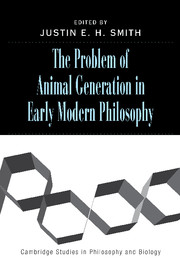Book contents
- Frontmatter
- Contents
- List of Contributors
- Introduction
- I THE DAWNING OF A NEW ERA
- II THE CARTESIAN PROGRAM
- III THE GASSENDIAN ALTERNATIVE
- IV SECOND-WAVE MECHANISM AND THE RETURN OF ANIMAL SOULS, 1650–1700
- V BETWEEN EPIGENESIS AND PREEXISTENCE: THE DEBATE INTENSIFIES, 1700–1770
- VI KANT AND HIS CONTEMPORARIES ON DEVELOPMENT AND THE PROBLEM OF ORGANIZED MATTER
- 14 Kant's Early Views on Epigenesis: The Role of Maupertuis
- 15 Blumenbach and Kant on Mechanism and Teleology in Nature: The Case of the Formative Drive
- VII KANT AND THE BEGINNINGS OF EVOLUTION
- Bibliography
- Index
14 - Kant's Early Views on Epigenesis: The Role of Maupertuis
Published online by Cambridge University Press: 06 August 2009
- Frontmatter
- Contents
- List of Contributors
- Introduction
- I THE DAWNING OF A NEW ERA
- II THE CARTESIAN PROGRAM
- III THE GASSENDIAN ALTERNATIVE
- IV SECOND-WAVE MECHANISM AND THE RETURN OF ANIMAL SOULS, 1650–1700
- V BETWEEN EPIGENESIS AND PREEXISTENCE: THE DEBATE INTENSIFIES, 1700–1770
- VI KANT AND HIS CONTEMPORARIES ON DEVELOPMENT AND THE PROBLEM OF ORGANIZED MATTER
- 14 Kant's Early Views on Epigenesis: The Role of Maupertuis
- 15 Blumenbach and Kant on Mechanism and Teleology in Nature: The Case of the Formative Drive
- VII KANT AND THE BEGINNINGS OF EVOLUTION
- Bibliography
- Index
Summary
Epigenesis was an important idea for Immanuel Kant from at least 1787, with his famous analogy in the B-version of the first Critique, and it played a central role in the “Critique of Teleological Judgment” of the third Critique (1790), where he identified his views with those of the great German physiologist Johann Friedrich Blumenbach. Yet neither the general concept of epigenesis in the eighteenth century nor its place in Kant's thinking has ever been stabilized in the scholarship. According to the historian of biology C. U. M. Smith, epigenesis is the idea in embryology that “organs … are progressively formed from, or emerge from, an originally undifferentiated, homogeneous [material].” I suspect that Kant was never comfortable with epigenesis, that it was a strain for his critical philosophy even when he explicitly invoked it, and that his attachment to Blumenbach was a case, as Robert Richards aptly put it, of mutual misunderstanding. That makes his involvement with epigenesis all the more interesting. To get at what troubled Kant, early and late, with the concept of epigenesis, I think it fruitful to go back to his earliest discussion, his response to the version propagated by a figure whom at the time he regarded extremely highly – Pierre Louis Moreau de Maupertuis, the president of the Prussian Academy in Berlin from 1746 to his death in 1759.
- Type
- Chapter
- Information
- The Problem of Animal Generation in Early Modern Philosophy , pp. 317 - 354Publisher: Cambridge University PressPrint publication year: 2006
- 5
- Cited by



